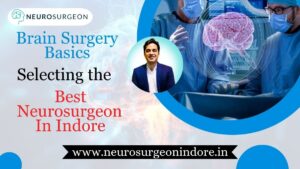As a patient seeking the expertise of a neurologist, finding the right specialist is crucial to proper diagnosis and treatment. When neurological issues arise, you want a doctor with the skill, experience, and bedside manner to address your concerns and care for you during what can be a frightening time.
Locating the best neurologist in a city as large as Indore requires research to identify physicians with expertise in your specific condition.
This article provides guidance on what to look for in a neurologist and offers recommendations to help narrow your search. Interviewing potential doctors, checking credentials and experience, reading reviews from current patients, and assessing hospital affiliations and technology access are all steps to finding the Neurologist In Indore best suited to provide you the highest quality care.
Your health and well-being depend on making an informed choice, and the time taken in the selection process will give you confidence in the physician you choose.
Table of Contents
ToggleWhat is a Neurosurgeon?
A neurosurgeon is a physician who specializes in the diagnosis and surgical treatment of disorders of the central and peripheral nervous system including the brain, spinal cord, and nerves.
What is the Difference Between a Neurologist and a Neurosurgeon?
When seeking medical care for a neurological condition, it is important to understand the difference between a neurologist and a neurosurgeon.
A Neurologist is a physician who specializes in the diagnosis and medical treatment of disorders of the nervous system. Neurologists treat conditions like epilepsy, Parkinson’s disease, Alzheimer’s disease, and multiple sclerosis using medication or therapy. Neurologists complete medical school and then at least 3 years of residency training in neurology.
A Neurosurgeon is a physician who specializes in the surgical treatment of disorders of the nervous system. Neurosurgeons treat conditions like brain tumors, hydrocephalus, intracranial aneurysms, spinal stenosis, and traumatic brain injuries through surgery. Neurosurgeons complete medical school and then 5-7 years of residency training in neurosurgery.
What Does a Neurosurgeon Do?
Diagnosing Disorders
A neurosurgeon diagnoses and treats disorders affecting the nervous system. This includes examining patients, ordering and interpreting diagnostic tests like MRI and CT scans, electroencephalograms, and electromyography. The neurosurgeon uses these to determine the cause of a patient’s symptoms and the best course of treatment.
Performing Surgery
Neurosurgeons operate on the brain, spine, and nerves to treat disorders detected during diagnosis. They perform procedures like craniotomies to access the brain, laminectomies to access the spine, and surgeries to implant shunts and stents.
Post-Operative Care
After performing surgery, the neurosurgeon monitors the patient to ensure proper recovery and healing. They oversee physical therapy, occupational therapy, and rehabilitation for patients when needed. The neurosurgeon also manages pain medication and follows up with patients to monitor their progress, checking that the surgery achieved the desired results and the patient’s symptoms are alleviated or managed.
In summary, a Neurosurgeon In Indore diagnoses and treats a wide range of disorders affecting the brain, spine, and nerves through surgical and non-surgical means. They perform life-saving procedures and help patients manage chronic or degenerative conditions to improve function and quality of life.

What Conditions Do Neurosurgeons Treat?
Neurosurgeons Treat a Wide Range of Conditions
Neurosurgeons diagnose and surgically treat disorders of the nervous system, including the brain, spinal cord, and nerves. They are medical experts in disorders that affect the most complex organ in the human body.
- Traumatic brain injuries from accidents or injuries
- Brain or spinal cord tumors, such as meningiomas, gliomas, and acoustic neuromas
- Vascular disorders like aneurysms, arteriovenous malformations, and cavernous malformations
- Hydrocephalus or excess fluid in the brain
- Chiari malformation where brain tissue protrudes into the spinal canal
- Herniated disks or spinal stenosis compressing the spinal cord or nerves
- Movement disorders such as Parkinson’s disease, essential tremor, and dystonia
- Congenital anomalies or birth defects like spina bifida or craniosynostosis
Surgical Procedures
Neurosurgeons employ innovative surgical procedures and advanced technology to treat conditions of the nervous system. Common surgeries include:
- Microsurgery: Using an operating microscope to perform delicate surgery
- Endovascular surgery: Accessing the nervous system through blood vessels to treat aneurysms or arteriovenous malformations
- Stereotactic radiosurgery: Delivering highly focused radiation to treat tumors or vascular malformations
- Functional neurosurgery: Surgery to treat movement or psychiatric disorders by altering the function of parts of the brain
- Spine surgery: Removing herniated disks or relieving pressure on the spinal cord and nerves through spinal fusion or laminectomy
Neurosurgery is a challenging yet rewarding field that allows surgeons to help patients with debilitating neurological conditions and traumatic injuries regain function and improve their quality of life.
Neurosurgeons undergo extensive training and education to acquire the knowledge and technical skills required to perform these complex surgeries.
Making the Most of Your Consultation
When seeing a neurosurgeon, come prepared with your medical history, test results, imaging studies and a clear list of symptoms. Be open and honest in describing your condition and concerns so the Best Neurosurgeon In Indore can properly assess your needs.
Ask questions about treatment options, risks, benefits, and prognosis so you understand your diagnosis and next steps. Seeking multiple opinions from neurosurgeons with experience in your specific disorder may help determine the best course of treatment.
With the right diagnosis and treatment from the Top Neurologist In Indore, many neurological disorders and injuries can be managed well or even cured. But as with any surgery, there are risks involved, so finding the right specialist is key.
Do your research, get references from your general physician and seek the most experienced neurosurgeon you can for your particular condition.
Conclusion
As you can see, finding the right Neurologist In Indore requires careful research and consideration of many factors. While low cost and insurance acceptance are important, a neurologist’s experience, qualifications, and patient satisfaction ratings should weigh heavily in your decision.
Don’t be afraid to schedule consultations with different doctors to find one you feel comfortable with and confident in. Your health and well-being depend on it.
With the number of high-quality neurology practices in Indore, you have many excellent options to choose from. Take your time, do your homework, and choose a neurologist you can build a long-term relationship with. Your brain and nervous system deserve nothing less.


















